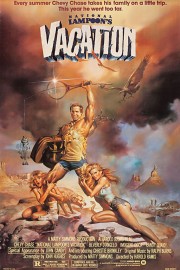National Lampoon’s Vacation
“National Lampoon’s Vacation” is one of those films that I’m fairly certain I did see as a kid, but cannot remember if I did entirely. So when I watched it during furlough in 2020, I considered it the first official viewing. I know “European Vacation” was something I watched multiple times, and “Christmas Vacation” has often been a holiday staple, but now that “Vacation” has “officially” been marked off the watchlist, it’s easy to see how someone can put this over those two (though I don’t think anyone’s ever put “European Vacation” ahead of either of these films). Harold Ramis has just the right mix of shaggy staging and sharp comedic direction of his actors to make this one timeless.
I both understand, and don’t, how this film received an R-rating. I’m guessing the nudity pushed it over the top, but the PG was fairly loose prior to the PG-13 rating in 1984 to where it’s kind of surprising to think of this as a movie kids could not get in to see. With the exception of scenes in the second half of the movie, the language is not really that harsh, and unlike a lot of times in the ’80s, the humor in John Hughes’s screenplay is not cruel. Much of it is directed at Clark Griswold, who only wants to take his family on a vacation across America. That’s the secret weapon that makes this one and “Christmas Vacation” work so well- Clark is the textbook definition of a good-natured father figure, but his good intentions gets in his way all too often.
Watching this film in particular, I certainly have memories of family vacations, and especially, the moments that didn’t work out. We went to Arizona for my dad’s work, but the worst thing that happened- if memory serves- is my mom and I playing table tennis, and the ball getting stuck in a tree. I’ll never forget my mom and mine’s first trip up to Ohio after we moved to Georgia, and we got off on Stinky Creek Road, and ended up losing a lot of time on that “detour.” We never accidentally tied a dog to the bumper, though. Or had a relative die on us in the car. Or breaking and entering at a theme park. You would think they would have heard the park was closed for two weeks, right? But Walley World isn’t Disney, even though, in Hughes’s original short story, it was. And Roy Walley (the great Eddie Bracken) sure does look like Walt.
These films don’t work without Hughes’s screenplays, or Chevy Chase as Clark. This is an ideal vehicle for Chase. Even when he goes skinny dipping with Christie Brinkley after an argument with Ellen (Beverly D’Angelo, every bit as vital to these films), you know he’s not really going to cheat on her- his reaction to Ellen seeing him tells you everything you need to know. That he can react to any crazy situation and not seem fazed one bit is one of the reasons Clark endures as an iconic character. Everything you need to know about him is in that first scene where he and Rusty (Anthony Michael Hall) go to pick up the car they’re trading for to go on the trip, and how Clark reacts to every curve ball. It almost makes him seem clueless the way the salesman (Eugene Levy) somehow convinces him that the station wagon they will eventually drive is what he wants, but it’s so well played by Chase that we don’t blink an eye, or think less of him. We want to see him succeed on his mission.
There are so many great people in this. Randy Quaid and Miriam Flynn as Eddie and Catherine are delightful as the relatives you try not to talk about, and John P. Navin Jr. and Jane Krakowski as Dale and Vicki are a riot. John Candy is great as the Walley World guard, and James Keach as the officer who pulls Clark over about the dog takes that role to another level. But Hall and Dana Barron as Rusty and Audrey are probably the definitive versions of those characters; they each have moments that feel authentic to kids, but also are as hilarious as anything any of the actors do. It’s easy to see why Hall went on to be an ’80s icon with Hughes, but it’s a shame Barron didn’t have the same jump.
It’s easy to not only see how this went on to spawn a series of vacation misadventures for the Griswolds, but why the people continue to go back to them, year after year. “Vacation” isn’t just for Christmas with the Griswolds; I’m glad I finally appreciate that.










